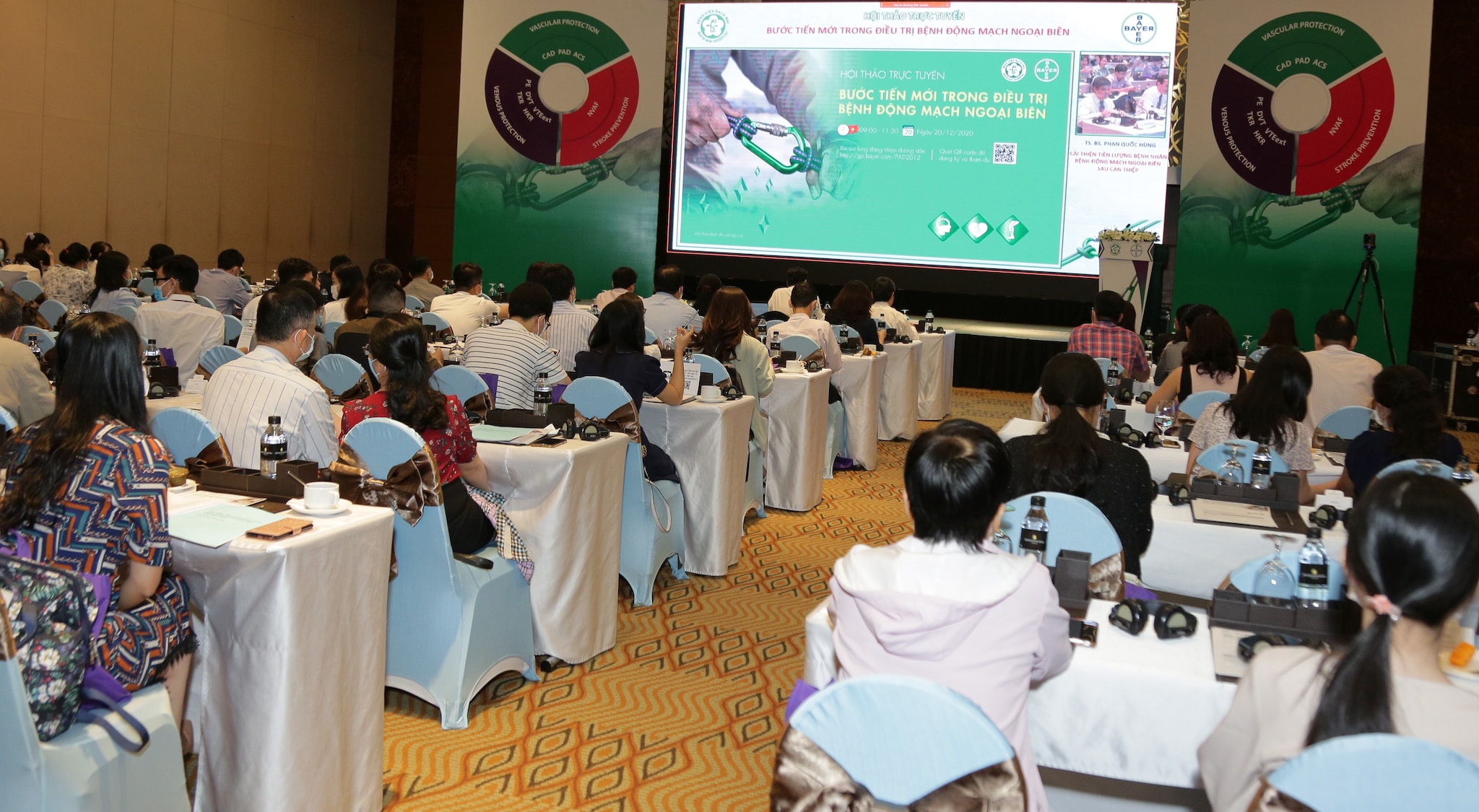New NOAC Indication marks a major milestone in the management of peripheral artery disease in Vietnam
- Bayer collaborates with Bach Mai Hospital to share medical knowledge and treatment advances in peripheral artery disease (PAD) through a hybrid medical scientific meeting.
- Bayer introduced the new indication of non-Vitamin K antagonist anticoagulant (NOAC) as an effective treatment for PAD patients, marking a new step in the medical field of anticoagulant treatment.
Ho Chi Minh City, 20 December 2020 – Bayer has collaborated with Bach Mai Hospital to organize a hybrid medical scientific event for the medical community specialising in cardiology and vascular medicine nationally, called “New Progress in the Management of Peripheral Artery Disease”. The seminar was held in both Hanoi and Ho Chi Minh city, as well as was broadcast online at the same time, providing a forum to discuss medical practices, unmet needs, and recent scientific data related to the management of peripheral artery disease (PAD). At the event, Bayer introduced a new indication of its non-Vitamin K antagonist anticoagulant (NOAC) as a solution for reducing major adverse cardiovascular and limb events in patients with PAD, marking a major milestone in the management of PAD in Vietnam.
Symposium marks new era in the field of anticoagulation for local PAD patients
The scientific event took place successfully with the participation of more than 400 cardiologists, interventional cardiologists, and vascular surgeons. The science program was chaired by Prof. Dr. Nguyen Quang Tuan – Director of Bach Mai Hospital, Honorary Chairman of Vietnamese Society of Interventional Cardiology, and Prof. Dr. Truong Quang Binh – Deputy Director of Ho Chi Minh City University of Medicine Hospital. Domestic and international experts participated in the report such as Prof. Dr. Marc Bonaca (University of Colorado School of Medicine) through an online platform, Dr. Nguyen Quoc Thai (Bach Mai Hospital), and Dr. Phan Quoc Hung (Cho Ray Hospital). The seminar discussed the latest developments in medical treatments and standard protocols, as well as updated the most advanced peripheral artery disease treatments. Specifically, the new indication of NOAC is part of an effective treatment for PAD to reduce the risk of stroke, myocardial infarction, and amputation.

PAD is a chronic, progressive disease in which narrowed arteries reduce blood flow, usually to the lower extremities. It is a growing concern that most patients with peripheral artery disease are asymptomatic. PAD patients often have disease in other arteries, such as the heart and brain. Patients are at risk for severe complications like stroke, myocardial infarction, and amputation.
According to Nature Review Cardiology’s statistics, globally, 200 million people were estimated to have peripheral artery disease in lower extremities in 2010. These studies indicated that the number of PAD patients accounted for the highest percentage in the middle – income and low – income countries in Southeast Asia, and the Western Pacific. In fact, PAD patients in Vietnam often get diagnosed only when they have leg pain even at resting, therefore, their prognosis tend to be worse than those of early diagnosed patients. In 2020, the field of peripheral artery disease has witnessed many new solutions and new treatment approaches for patients.

At the seminar, Prof. Dr. Nguyen Quang Tuan raised the importance and the burden of PAD patients in order to share experiences and new treatment solutions with colleagues, providing new recovering opportunities.
Besides, Dr. Nguyen Quoc Thai presented the challenges and new solutions in the management of peripheral artery thrombosis. Dr. Phan Quoc Hung outlined the current treatment and put into context about improving prognosis for peripheral artery disease after intervention. Dr. Marc Bonaca presented data on protecting of patients with PAD across the disease spectrum.
To summarise the seminar, Prof. Dr Truong Quang Binh stated that for the first time, in the field of peripheral artery disease, there were 2 randomised controlled clinical trials (RCTs) that demonstrated antithrombotic therapy significantly reduced the risk of major adverse cardiovascular events (MACE), stroke, myocardial infarction, as well as major adverse limb events (MALE) including amputation, from the chronic presentation (COMPASS study) to acute presentation (VOYAGER PAD study). These studies marked a stepping stone in treatment guidelines and practices to protect PAD patients more efficiently.
Bayer introduces new indication of NOAC for the treatment of PAD
The novel antithrombotic therapy for the management of PAD, termed dual pathway inhibition, combines vascular dose of NOAC with aspirin (ASA). The therapy has been recommended in the 2019 Global Vascular Guidelines jointly developed by the Society of Vascular Surgery (SVS), the European Society for Vascular Surgery (ESVS), and World Federation of Vascular Societies (WFVS), as well as the European Society of Cardiology (ESC) guidelines for NSTE-ACS in 2020. The new indication of NOAC vascular dose as the first and unique in its class has proven the possibilities for the simultaneous prophylaxis of cardiovascular and limb complications in PAD patients. NOAC in combination with aspirin has shown many advantages in the treatment of PAD patients compared to traditional therapy. In fact, compared to aspirin alone, the combined therapy reduces the risk of cardiovascular death, stroke, or myocardial infarction by 28 percent and that of major adverse limb events, including amputation by 46 percent, without increasing the rate of fatal or intracranial bleeding. As a result, PAD patients using NOAC with Aspirin can prevent some severe complications of the disease.
In recent years, Bayer has put great effort into developing treatments for patients suffering from PAD. In November 2017, the company applied for NOAC in combination with aspirin for approval by the European Medicines Agency for the management of PAD. In Vietnam, the collaboration between Bayer and Bach Mai Hospital is the first time the new indication of NOAC has been officially introduced. The new indication reflects Bayer’s long-standing commitment to improved prognosis and a better quality of life for PAD patients.

MD. MBA Tran Thi Lan Huong, Medical Director at Bayer Vietnam shared, “Cardiovascular diseases have become a severe problem in our society. Bayer is working in a wide range of areas on new treatment approaches for cardiovascular diseases. Globally, Bayer cooperates with research institutes and supports clinical research activities to ensure doctors have access to the latest treatments, so that patients will have access to the best possible medical therapies and services. With this goal, we are honored to cooperate with Bach Mai Hospital to organize the scientific event “New Progress in the Management of Peripheral Artery Disease”. The seminar provided useful information to the medical community in Vietnam. We hope that Bayer's new solution can help reduce the number of patients suffering from thrombotic diseases, thereby helping Vietnamese people improve their quality of life.”